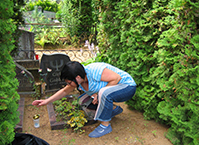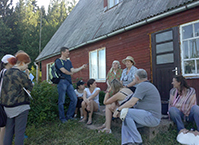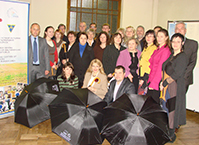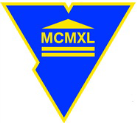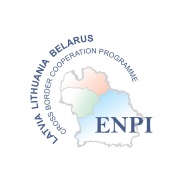E-MUSEUM “VITAMEMORIAE”: COLLECTION AND RESEARCH
Foto
To record people’s life stories, traditions, customs, rituals, rare photographs, old documents, ethnographic differences in funeral rites, etc. the researchers of Daugavpils University and Yanka Kupala Grodno State University carried out field studies in LV and BY territories: in the villages of Krāslava, Rēzekne, Daugavpils regions (Asūne, Foļvarka, Kruki, Skrudaliena, Indra, etc.) and in Belarus (Braslav and Vitebsk districts). The field studies were implemented in the framework of the project “Popularization of the Centres of Oral History in the LV – BY Cross-Border Area”, ID Nr. LLB–2–143, of the Cross Border Cooperation Programme Latvia–Lithuania–Belarus implemented within the framework of the European Neighbourhood and Partnership Instrument 2007–2013.
During the research and the expeditions, the project implementers collected, segmented, transcribed, and digitized the audio-visual materials (audio and video records, photo evidence). To make the collection of the E-Museum more complete, the field researchers and cemetery researchers of Daugavpils University and Grodno University will segment and systematize the audio-visual materials collected during oral history, cemetery research, folklore and dialectology expeditions of the previous years that until now have not been used, aiming at including the best and most valuable segments of the collection into the E-Museum.
The story tellers whose life stories make the input of the E-Museum are people of various generations, mostly elderly people. The childhood of aged people, who at present are about 80 years old, proceeded in the 1930s, therefore the segmented audio-visual units included in the E-Museum chronologically begin from 1929 and can describe only the respondents’ childhood memories. The memory of the older generation is particularly important for the anthropological and historical research – it shifts the time borders, allows for moving to the events of the past through the viewpoints of those who have experienced those times. The facts can be found in chronicles, but what the witnesses of that time can reveal give the memories colour, scent, involve one into mutual emotional experience. The witnesses of the epoch tell about the events form the viewpoint of their own experience.
To motivate the respondents to share their life stories, the project field researchers used Paul Thomson’s oral history research method – enlarged vision of social history where diverse groups of the society are brought together and share common historical experience.
The research basis is the methodology of a semi-structured interview that envisages focused (guided) reconstruction of the past events and an interviewer only helps the respondents to reconstruct the past.
The oral history collection of the E-Museum is envisaged to be used not only by specialists but also by a greatest possible range of non-specialists, therefore, departing from the academic tradition envisaging a complete script and transcript (written transcription of an audio or video record) of life stories, the project experts agreed to segment 360 most vivid, colourful, expressive, unusual, typological or extraordinary audio-visual units (photo, video and audio testimonies) – thematically complete excerpts, and to systematize them according to the thematic plan that would encompass both the historical processes of the 20th century (from the 1920s-30s) and the most essential events of an individual’s life.
ACCESSIBILITY OF THE COLLECTION
The interviews included into the collection are arranged according to the principle of historicism, anthropologism and personalia, indicating the author’s name and the interviewer’s name and surname.
-
The beer traditions
You mentioned that when beer is made then there are many related doings, traditions. Maybe you could tell me what these traditions are and where they are carried out, where you live, where it all is? …
Researcher: Dr. philol. Valentīns Lukaševičs, Daugavpils Universitāte
Categories: Dagnija Bramane
-
The traditional Jāņi [Līgo, Midsummer night festivities] drink must be beer. What can you say about beer?
Then, when some festivity is at hand, especially the Summer solstice, then we always ask Dad to make beer. He then says – well, I don’t know, if you help me to carry the water, …
Researcher: Dr. philol. Valentīns Lukaševičs, Daugavpils Universitāte
Categories: Dagnija Bramane
-
About the cheese preparation
You’ve said that you make cheese yourself – both Jāņi cheese and other types of cheese. Could you briefly tell me how you do that?
Yes, cheese is of various kinds. There is the so- …
Researcher: Dr. philol. Valentīns Lukaševičs, Daugavpils Universitāte
Categories: Dagnija Bramane
-
About The collecting and desiccation of herbs
Are there any regularities of collecting and desiccation? You named those herbs. Maybe you could tell me, if the moon phase is important, what the rules are, how herbs are desiccated, how …
Researcher: Dr. philol. Valentīns Lukaševičs, Daugavpils Universitāte
Categories: Dagnija Bramane
-
I suppose, in Latgale almost in every farmhouse people collect plants and medical plants, which are desiccated and used to make tea?
Yes, also at my home my ancestors were walking the fields and looking for herbs, and also my grandmother told me a lot, that my grandmother’s mom also collected various herbs. Me too, reading a …
Researcher: Dr. philol. Valentīns Lukaševičs, Daugavpils Universitāte
Categories: Dagnija Bramane
-
In former days, this tradition was very popular, very common. It is said that now it has been lost. This tradition is joint work.
You are right; one man cannot do as much as all together. Traditionally, in our area this tradition of joint work has been preserved. It usually manifests itself more like the so-called potato joint …
Researcher: Dr. philol. Valentīns Lukaševičs, Daugavpils Universitāte
Categories: Dagnija Bramane
-
What can you tell about celebrating Līgo [Midsummer night festivities]?
I think that there is a difference between how midsummer celebration happens today and what it was in the past, in more olden days. But the main features are preserved, such as brewing. It is when …
Researcher: Dr. philol. Valentīns Lukaševičs, Daugavpils Universitāte
Categories: Dagnija Bramane
-
Was such a thing as anecdotes popular in Latgale in the past?
I remember that only from my childhood, the anecdotes were mostly political. If it was Khrushchev’s time, then people told anecdotes about Khrushchev, if Brezhnev’s – then about …
Researcher: Dr. philol. Valentīns Lukaševičs, Daugavpils Universitāte
Categories: Arvid Ratnieks
-
How did children play, what games did they play when being small?
I don’t know what small kids were doing, but at the time, since I remember myself, well, what were we doing? There was such an interesting small gadget, I don’t know, it must have been …
Researcher: Dr. philol. Valentīns Lukaševičs, Daugavpils Universitāte
Categories: Arvid Ratnieks
-
What were the entertainments in a rural family and leisure evenings?
I remember my childhood in the countryside, when there was no electricity yet. We had to buy kerosene. Kerosene was not very expensive in the soviet times, but we still did not use it too often. And …
Researcher: Dr. philol. Valentīns Lukaševičs, Daugavpils Universitāte
Categories: Arvid Ratnieks


